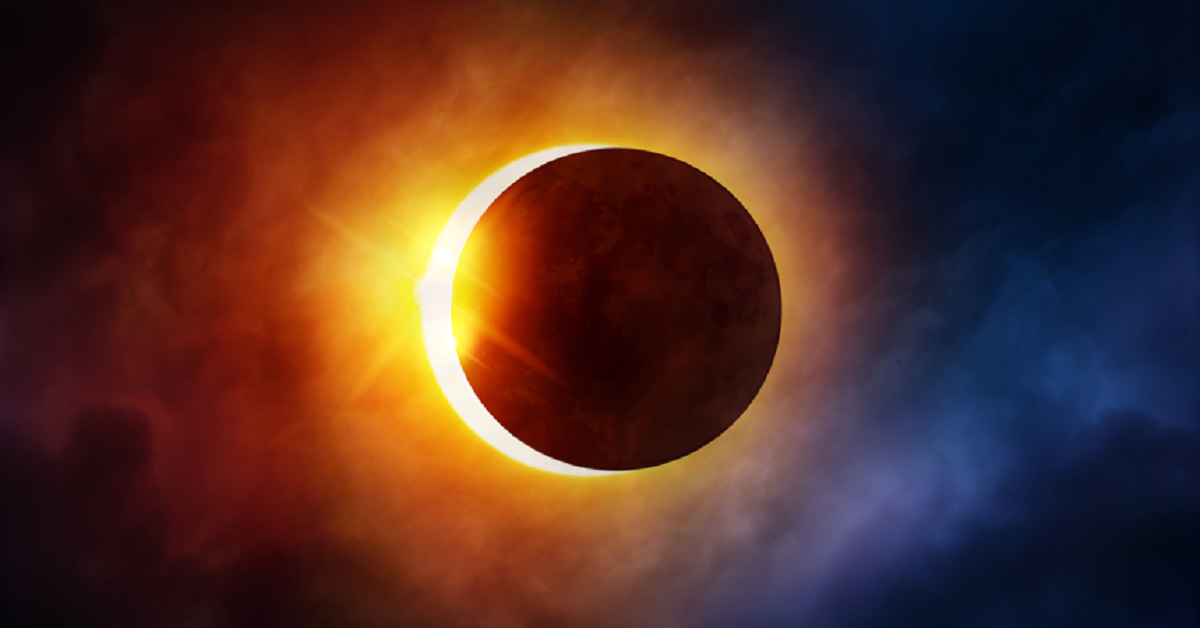
Muslims recognize that everything in the heavens and on earth is created and sustained by the Lord of the universe, Allah Almighty. Throughout the Qur’an, people are encouraged to look around them, observe and reflect on the beauties and wonders of the natural world – as signs of Allah’s majesty.
“Allah is He, who created the sun, the moon, and the stars — (all) governed by laws under His commandment.” Qur’an 7:54
“It is He who created the night and the day and the sun and the moon. All (the celestial bodies) swim along, each in its orbit.” Qur’an 21:33
“The sun and the moon follow courses exactly computed.” Qur’an 55:05
In remembrance and gratefulness for all of His favors, Muslims all over the world bow down in prayer five times each day. At a time of a solar or lunar eclipse, there is a recommended prayer (salatul-kusuf) that is performed by the Muslim community in congregation.
The Prophet’s Tradition (peace be upon him)
During the lifetime of the Prophet Muhammad (peace be upon him), there was a solar eclipse on the day that his son Ibrahim died. Some superstitious people said that the sun eclipsed because of the young child’s death and the Prophet’s sadness on that day. The Prophet corrected their understanding:
Narrated Al-Mughira bin Shu’ba: On the day of Ibrahim’s death, the sun eclipsed and the people said that the eclipse was due to the death of Ibrahim (the son of the Prophet).
Allah’s Apostle said, “The sun and the moon are two signs amongst the signs of Allah. They do not eclipse because of someone’s death or life. So when you see them, invoke Allah and pray till the eclipse is clear.”
Reasons that Muslims should be humble before Allah during an eclipse
An eclipse is a sign of the majesty and power of Allah.
Narrated Abu Masud: The Prophet said, “The sun and the moon do not eclipse because of the death of someone from the people but they are two signs amongst the signs of Allah. When you see them, stand up and pray.”
An eclipse can cause people to become frightened. When frightened, Muslims turn to Allah for patience and perseverance.
Narrated Abu Bakr: Allah’s Apostle said: “The sun and the moon are two signs amongst the signs of Allah and they do not eclipse because of the death of someone, but Allah frightens His devotees with them.”
An eclipse is a reminder of the Day of Judgment.
Narrated Abu Musa: The sun eclipsed and the Prophet got up, being afraid that it might be the Hour (i.e. Day of Judgment). He went to the Mosque and offered a prayer with the longest Qiyam, bowing and prostration that I had ever seen him doing. Then he said, “These signs which Allah sends do not occur because of the life or death of somebody, but Allah makes His worshipers afraid by them. So when you see anything thereof, proceed to remember Allah, invoke Him and ask for His forgiveness.”
How the Prayer is Performed
The eclipse prayer is offered in congregation.
Narrated ‘Abdullah bin ‘Amr: When the sun eclipsed in the lifetime of Allah’s Apostle an announcement was made that a prayer was to be offered in congregation.
The eclipse prayer is two rakats (cycles of prayer).
Narrated Abu Bakr: In the lifetime of the Prophet the sun eclipsed and then he offered a two Rakat prayer.
Each rakat of the eclipse prayer has two bowings and two prostrations (for a total of four).
Narrated Aisha: The Prophet led us and performed four bowings in two Rakat during the solar eclipse, and the first Raka was longer.
Narrated ‘Aisha: In the life-time of Allah’s Apostle, the sun eclipsed, so he led the people in prayer, and stood up and performed a long Qiyam, then bowed for a long while. He stood up again and performed a long Qiyam but this time the period of standing was shorter than the first. He bowed again for a long time but shorter than the first one, then he prostrated and prolonged the prostration. He did the same in the second Raka as he did in the first and then finished the prayer; by then the sun (eclipse) had cleared.
He delivered the Khutba (sermon) and after praising and glorifying Allah he said, “The sun and the moon are two signs amongst the signs of Allah; they do not eclipse on the death or life of anyone. So when you see the eclipse, remember Allah and say Takbir, pray and give Sadaqa (charity).”
In modern times, superstitions and fear surrounding solar and lunar eclipses have diminished. However, Muslims continue the tradition of praying during an eclipse, as a reminder that Allah Alone has power over all things, in the heavens and on earth.
Also Read: Enlightening Your Minds: Good Evening…! Here is what Quran says about day and night?

Post Your Comments